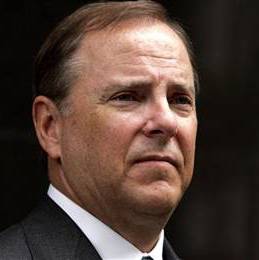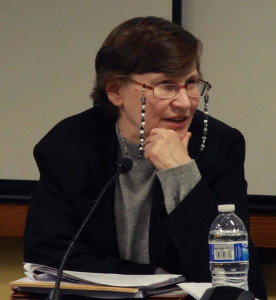 On the heels of the U.S. Supreme Court’s decision earlier this year to hear Conrad Black’s appeal of his criminal conviction on honest services wire-fraud charges under 18 U.S.C. § 1346 (“Section 1346”), the Court yesterday granted former Enron CEO Jeff Skilling’s appeal on similar grounds.
On the heels of the U.S. Supreme Court’s decision earlier this year to hear Conrad Black’s appeal of his criminal conviction on honest services wire-fraud charges under 18 U.S.C. § 1346 (“Section 1346”), the Court yesterday granted former Enron CEO Jeff Skilling’s appeal on similar grounds.
My sense is that Skilling has a good chance of having the Supreme Court overturn his conviction. Here’s why.
The Fifth Circuit Court of Appeal’s decision in Skilling’s appeal — which is looking by the minute similar to the Fifth Circuit’s decision in the Arthur Andersen case that was overturned by a unanimous Supreme Court — made a mess of two key issues:
(i) application of the honest services wire-fraud statute to Skilling’s actions, and
(ii) application of the standard for deciding the proper venue for Skilling’s trial in the face of a presumption of community prejudice against Skilling.
The Fifth Circuit panel’s decision in Skilling’s appeal failed to reconcile the reasoning in upholding Skilling’s conviction for honest services wire-fraud with earlier Fifth Circuit panel decisions on the same issue in the Nigerian Barge and Kevin Howard cases.
Inasmuch as there is now a split between Fifth Circuit decisions and several other circuit appellate courts on the scope of honest services wire-fraud, the issue is ripe for Supreme Court consideration. Indeed, Justice Antonin Scalia earlier this year urged the Supreme Court to take up the issue in his dissent from denial of certiorari in Sorich, et al v. U.S., 129 S.Ct. 1308, 1310 (2009):
“Without some coherent limiting principle to define what ‘the intangible right of honest services’ is, whence it derives, and how it is violated, this expansive phrase invites abuse by headline grabbing prosecutors in pursuit of local officials, state legislators, and corporate CEOs who engage in any manner of unappealing or ethically questionable conduct. . . . Indeed, it seems to me quite irresponsible to let the current chaos prevail.”
Since Justice Scalia’s dissent in Sorich, at least four other Justices (the number it takes to grant an appeal to the Supreme Court) have repeatedly voted over the objection of the Department of Justice to confront the meaning and constitutionality of Section 1346, first in the Black appeal, again in another case in June (Weyhrauch v. U.S.) and now in the Skilling appeal.
As I’ve noted many times over the years, the Enron Task Force’s use of honest services wire-fraud charges to criminalize Enron executives has been the legal equivalent of trying to stick a square peg in a round hole.
Honest services wire-fraud under Section 1346 was intended by Congress to penalize corporate executives and governmental officials for accepting bribes and kickbacks and for engaging in self-dealing at the expense of the employer– i.e., the private gain requirement of the crime.
The Task Force faced a big problem with prosecuting Skilling at all because he never stole a dime from Enron (that is, no private gain). In fact, the Task Force conceded at trial that, not only did Skilling not embezzle any money from Enron, the case against him was not about “greed,” that Skilling always sought to pursue Enron’s “best interests,” and that every act for which he was being prosecuted was undertaken for the purpose of protecting Enron and promoting its share price.
Despite the foregoing, the Task Force persuaded U.S. District Judge Sim Lake to allow the prosecution to proceed against Skilling on a much broader honest services theory — that is, that Skilling simply took on too much risk for the long-term good of Enron and improperly touted the company to the markets.
However, all corporate executives take business risks and promote their companies, so a rule that criminalizes any business decision that seems imprudent to prosecutors or lay jurors operating with hindsight bias — even if if the executive was pursuing the interest of the company — would force corporate executives to proceed at peril of criminal liability in making day-to-day business judgments.
Indeed, in a civil case, Skilling would have had the protection of the “business judgment rule” for his business decisions, but the Enron Task Force’s theory of honest services in Skilling’s case provided for no such defense. Instead, the Task Force lawyers urged the jury to send Skilling to prison effectively for life simply because he breached his duty to do his job and do it appropriately.
Thus, the essence of Skilling’s appeal on the honest services wire-fraud issue is that bribes, kickbacks, and self-dealing is what Congress intended to criminalize under Section 1346, not lapses in business judgment. Where a corporate executive has not sought private gain, his conduct — no matter how questionable, unwise, or wrongful — should not be subject to prosecution under Section 1346, but should be left to assessment for damages that it caused in a civil lawsuit in which responsibility can be assessed to all potentially responsible parties.
The Supreme Court will also consider Skilling’s arguments that (i) if Section 1346 is not limited as described above, it must be struck down entirely as unconstitutionally vague, and (ii) strongly negative publicity about Enron and Skilling in Houston made it impossible for him to be tried by an impartial jury.
On that latter issue, Skilling argues that the Fifth Circuit improperly allowed Judge Lake to rebut a presumption of community prejudice against Skilling through a superficial voir dire of individual jurors even though the Fifth Circuit concluded that Judge Lake had improperly failed to apply the presumption of community prejudice against Skilling.
Frankly, given the extensive evidence of both pervasive local media bias and prospective juror bias against Skilling, if the Supreme Court allows the Fifth Circuit’s decision to stand on the venue issue, then a denial of a motion to change the venue of a trial within the Fifth Circuit will effectively no longer be grounds for an appeal.
Accordingly, the Supreme Court’s review of Section 1346 in the Skilling appeal and the two related cases directly confronts how avaricious prosecutors have abused the open-ended nature of the statute. The amicus brief of the National Association of Criminal Defense Attorneys in the Skilling appeal sums it up well:
[T]he time has come to resolve the confusion that engulfs the honest services statute. [. . .] [The fundamental issue is] whether courts have the power to engraft limiting principles — none of which has any strong textual basis — on the vague language of Sec. 1346. If federal judges lack that power, then the Court must decide whether the honest services statute, shorn of judge-created limiting principles, is void for vagueness . . . The effort by courts to infuse meaning into Sec. 1346 collides . . . with the principle that there is no federal common law of crimes. . . Federal crimes are defined by statute rather than by common law.
Meanwhile, back down in the trial court part of the Skilling case, things are looking even worse for the prosecution.
First, the Fifth Circuit ordered Judge Lake to re-sentence Skilling because of an error that was made in applying a sentencing enhancement in assessing Skilling’s 24-year sentence. The District Court’s docket of Skilling’s criminal case reveals that Judge Lake originally scheduled Skilling’s re-sentencing for July 30th, but that Skilling and the prosecution filed a joint motion requesting Judge Lake to put off the re-sentencing indefinitely pending the filing of Skilling’s motion for a new trial, the prosecution’s response to that motion, and the Court’s disposition of the motion.
In that regard, the Fifth Circuit decision invited Skilling to file a motion for new trial based on issues of prosecutorial misconduct that Skilling raised in the appeal after discovering the evidence post-trial.
Specifically, the Fifth Circuit was particularly concerned about the failure of the Enron Task Force to comply with federal rules requiring the disclosure of exculpatory evidence to the defense from the Task Force’s pre-trial interviews with main Skilling accuser, former Enron CFO Andrew Fastow.
Fastow testified at trial that he told Skilling about the Global Galactic agreement, which purportedly documented a series of illegal “side deals” between Fastow and former Enron chief accountant Richard Causey that guaranteed Fastow would not lose money on certain special purpose entities that he was managing. Skilling denied any knowledge of the purported agreement.
After Skilling’s conviction, the Skilling defense team discovered Fastow interview notes that the Enron Task Force had failed to disclose to the Skilling team prior to trial. Among other things, those notes revealed that Fastow had told the Task Force lawyers that he didn’t think he had told Skilling about the Global Galactic agreement. The Fifth Circuit characterized the Task Force’s non-disclosure as “troubling” in inviting Skilling to file a motion for new trial with the District Court.
Interestingly, the docket reflects that the parties have requested that the deadline for Skilling’s motion for a new trial be pushed back several times over the past six months. The deadline is now in mid-November and, as a result of the Supreme decision to review of Skilling’s appeal, will probably be pushed back until after the Supreme Court rules.
So, what is going on here?
Could it be that Skilling’s team has discovered even more exculpatory evidence that the Task Force failed to disclose to the Skilling defense prior to the trial?
Could it be that the government’s current lawyers — who were not members of the now-disbanded Task Force — are now finding themselves dealing with a serious failure of the Task Force members to comply with rules requiring the disclosure of exculpatory evidence to the defense in Skilling’s case and have little incentive to cover for their predecessors?
In short, could the Skilling case in the trial court be turning into something similar to this?
Finally, as if to remind us how little we have learned from the Enron debacle, on the same day that the Supreme Court announced that it would consider Skilling’s appeal, the parties began picking a jury in the criminal case against two Bear Stearns executives who are accused of committing the “crime” of violating the obligation to throw in the towel on their business venture. Larry Ribstein has more.
A humane and civil society would find a better way to hold people responsible for their errors in business judgment while creating jobs for communities and wealth for investors. I am hopeful that the Supreme Court will agree.
Like this:
Like Loading...




.png) The Houston legal community remains in shock over
The Houston legal community remains in shock over  Stetson College of Law Professor
Stetson College of Law Professor 


